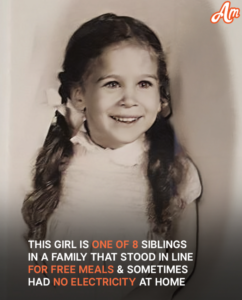Her name is Mia, and she comes from a family that’s experienced more hardship than most could imagine. Growing up, Mia was one of eight siblings, each with their own dreams, ambitions, and challenges. But no matter how unique their individual journeys might have been, one thing they all shared was the weight of poverty.
The family’s home was modest—if you could even call it that. It was small, run-down, and often lacked basic necessities that many people take for granted. Sometimes, there was no electricity, and Mia and her siblings would go to bed in the dark, their small bodies curled up under the warmth of a few blankets, hoping for the power to come back on by morning. They learned early on how to make do with what little they had, growing accustomed to the sounds of neighbors huddled around their own candles, their lives intersecting in quiet solidarity.
But the power outages were only a small piece of their daily reality. The family lived paycheck to paycheck, scraping by with whatever they could. Mia remembers the days when food was scarce, when her mother would stretch what little they had, sometimes serving meals made from leftovers or low-cost ingredients. There were times when the only meals they could count on were the ones that came from the free lunch program at school.
Mia’s memories of standing in line for those free lunch tickets are vivid. She recalls the feeling of standing there with her siblings, feeling both grateful for the meal yet embarrassed by the constant reminder of their poverty. There were no fancy trays or special orders; the lunches were basic, but they were enough to fill their stomachs for the day. And that was the goal: survive the day. But there was always an undercurrent of shame, of being different from the other kids who didn’t have to worry about lunch, whose families weren’t struggling.
Despite the harshness of their circumstances, Mia never felt alone. Her siblings were her constants, and together they formed a tight-knit unit, supporting one another through thick and thin. They didn’t have the luxury of many toys or extracurricular activities, but they had each other. They would often share stories late into the night, dreaming of better days, of the lives they could build if only they could get out of this cycle.
But it wasn’t just about surviving—Mia’s family had a deep belief in the importance of education. Her parents, though overwhelmed by their own challenges, always emphasized the value of learning. Mia remembers her mother telling her, “Education is the key to breaking out of this.” That belief stuck with her through thick and thin, and it fueled her drive to excel in school.
Now, looking back, Mia realizes just how far she’s come. She’s the first in her family to graduate from college, a goal that once seemed unattainable. Her siblings, too, have carved out their own paths, some finding success in various careers, others building families of their own. Yet, they all share the same story: a story of resilience, of overcoming the odds, and of rising from the depths of poverty to create lives that were once just a distant dream.
Mia’s journey is a testament to the power of perseverance, to the strength of family, and to the unwavering belief that even in the face of poverty, there is always a chance for a better tomorrow.
